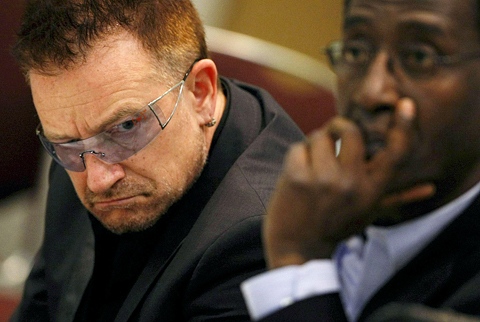African leaders yesterday lashed out at rich nations for failing to tackle trade inequalities even as they make lofty pledges to boost aid.
The leaders, in Japan for a major development conference, urged industrialized nations to make it easier for them to export food, coffee and other products at fair prices.
“Pursuit of unfair trade practices by the big powers as well as difficult access for African products to markets of developed countries continue to penalize our states and significantly destroy their performance in the creation of riches,” Burkina Faso President Blaise Compaore said.

PHOTO: EPA
Forty heads of states from Africa are participating in the three-day conference on economic growth, stability and climate change.
Japanese Prime Minister Yasuo Fukuda pledged yesterday to double aid to Africa by 2012 and to help the continent double rice production to ease food shortages.
In recent weeks and months, soaring prices for essential foodstuffs such as rice, wheat and corn in some of the world’s poorest nations have sparked demonstrations across Africa.
But some African leaders said their countries were more concerned about unfair trade deals than a lack of things to eat.
“There is a big problem of food in the world now and a problem of energy. In Uganda, there is a problem of a different kind. We have too much food and no market to export it to,” Ugandan President Yoweri Museveni said. “Why? Because of bad policies in Europe, America and even in Japan.”
He said his country was facing “a real struggle” to get a fair deal for its natural resources, including agricultural and mineral products.
For example, a kilogram of unprocessed Ugandan coffee would be sold for US$1 at home but for US$14 in Britain after it has been refined, he said.
“I see some people here who are called donors,” Museveni told the conference audience. “Now, I really have a problem with that definition. Because I don’t know who’s helping who.”
Fair trade campaigners say that while poor countries have been forced to open up their markets, rich nations have kept unfair practices such as farm subsidies, while multinational companies fail to give farmers a fair deal.
Gabonese President Omar Bongo Ondimba urged Japan to boost direct investment in Africa and open up Japanese markets to African products.
“Japan can weave with Africa a strategic partnership which is mutually beneficial,” he said.
The gathering in Yokohama, near Tokyo, is seen as an effort by Japan to expand its influence in Africa, where China and India are also seeking closer ties and supplies of natural resources to fuel their rapid economic growth.
Japan also announced a US$2.5 billion initiative to help its companies do business in Africa, paving the way for private sector investment, which some African leaders said was sorely lacking.

Kehinde Sanni spends his days smoothing out dents and repainting scratched bumpers in a modest autobody shop in Lagos. He has never left Nigeria, yet he speaks glowingly of Burkina Faso military leader Ibrahim Traore. “Nigeria needs someone like Ibrahim Traore of Burkina Faso. He is doing well for his country,” Sanni said. His admiration is shaped by a steady stream of viral videos, memes and social media posts — many misleading or outright false — portraying Traore as a fearless reformer who defied Western powers and reclaimed his country’s dignity. The Burkinabe strongman swept into power following a coup in September 2022

‘FRAGMENTING’: British politics have for a long time been dominated by the Labor Party and the Tories, but polls suggest that Reform now poses a significant challenge Hard-right upstarts Reform UK snatched a parliamentary seat from British Prime Minister Keir Starmer’s Labor Party yesterday in local elections that dealt a blow to the UK’s two establishment parties. Reform, led by anti-immigrant firebrand Nigel Farage, won the by-election in Runcorn and Helsby in northwest England by just six votes, as it picked up gains in other localities, including one mayoralty. The group’s strong showing continues momentum it built up at last year’s general election and appears to confirm a trend that the UK is entering an era of multi-party politics. “For the movement, for the party it’s a very, very big

ENTERTAINMENT: Rio officials have a history of organizing massive concerts on Copacabana Beach, with Madonna’s show drawing about 1.6 million fans last year Lady Gaga on Saturday night gave a free concert in front of 2 million fans who poured onto Copacabana Beach in Rio de Janeiro for the biggest show of her career. “Tonight, we’re making history... Thank you for making history with me,” Lady Gaga told a screaming crowd. The Mother Monster, as she is known, started the show at about 10:10pm local time with her 2011 song Bloody Mary. Cries of joy rose from the tightly packed fans who sang and danced shoulder-to-shoulder on the vast stretch of sand. Concert organizers said 2.1 million people attended the show. Lady Gaga

SUPPORT: The Australian prime minister promised to back Kyiv against Russia’s invasion, saying: ‘That’s my government’s position. It was yesterday. It still is’ Left-leaning Australian Prime Minister Anthony Albanese yesterday basked in his landslide election win, promising a “disciplined, orderly” government to confront cost-of-living pain and tariff turmoil. People clapped as the 62-year-old and his fiancee, Jodie Haydon, who visited his old inner Sydney haunt, Cafe Italia, surrounded by a crowd of jostling photographers and journalists. Albanese’s Labor Party is on course to win at least 83 seats in the 150-member parliament, partial results showed. Opposition leader Peter Dutton’s conservative Liberal-National coalition had just 38 seats, and other parties 12. Another 17 seats were still in doubt. “We will be a disciplined, orderly